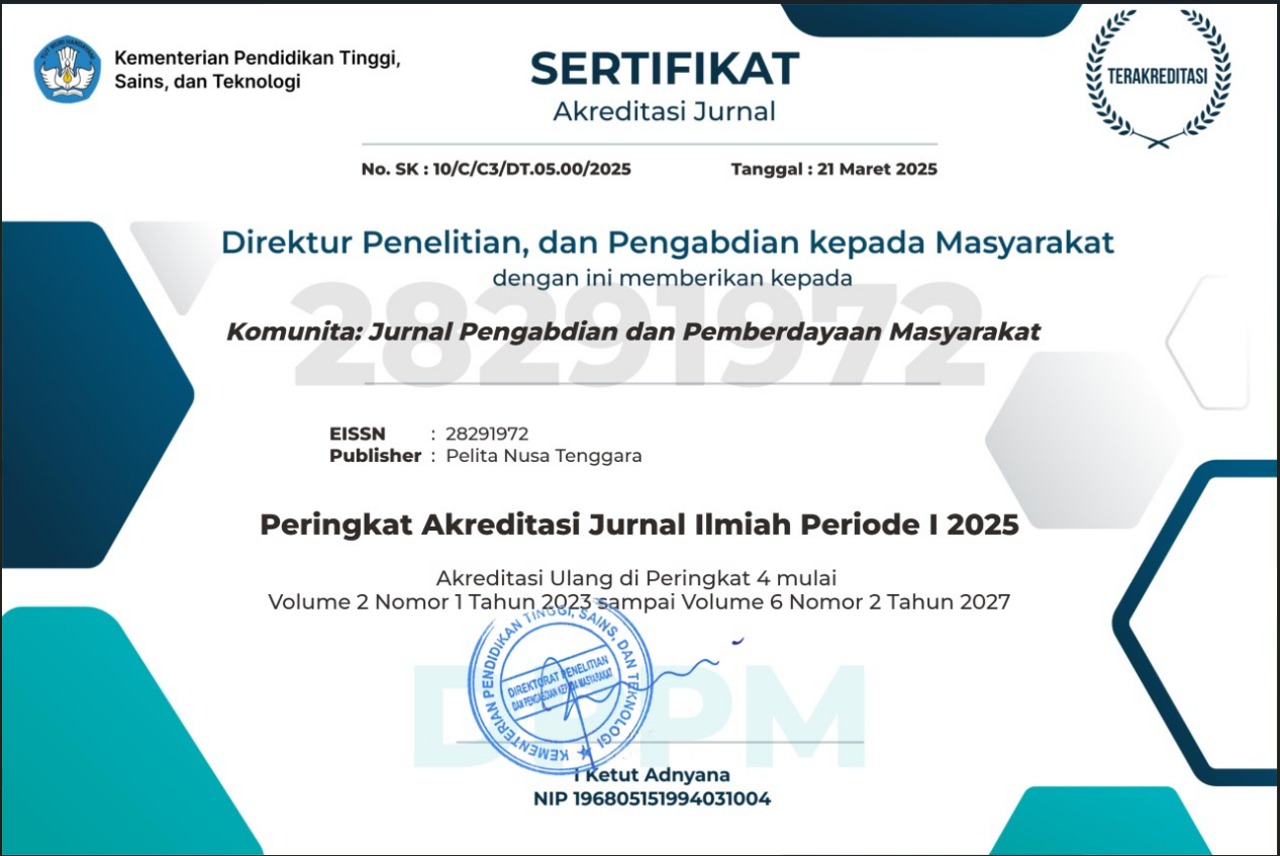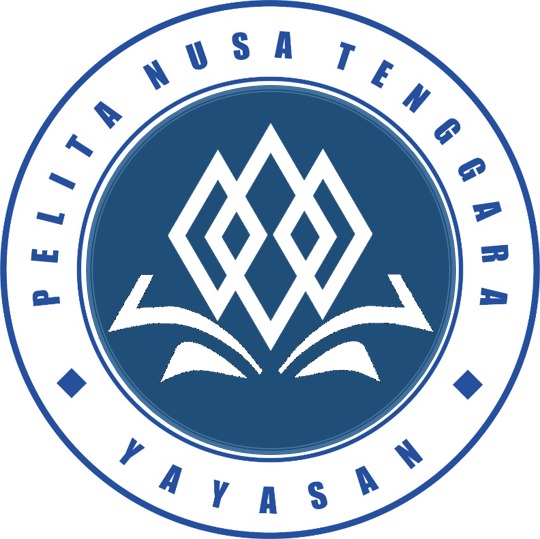Pelatihan Pembelajaran Kolaboratif Jumping Task Berbasis Bahasa Matematis Tapsel Untuk Meningkatkan Kompetensi 6C Abad 21 Siswa SD Negeri 100601 Pintu Padang
Abstract
Collaborative Learning Training of Jumping Task Technique Based on Tapsel Mathematical Language to Improve 21st Century 6C Competencies of Elementary School Students 100601 Pintu Padang. The partners of this community service activity are 22 students of grade V of SD Negeri 100601 Pintu Padang. The partner's problems are as follows: 1) minimal school facilities, 2) students' difficulties in understanding mathematics, 3) low interest in learning mathematics, 4) students' perspectives that consider mathematics as a difficult and boring lesson, 5) low ability and skills of some teachers in presenting teaching materials as interestingly as possible, and 6) limited economic conditions for students to participate in tutoring, 7) Low Competence 6 C, 8) the need to use student language that is based on the experience of the Batak language of Tapsel. To address these issues, we are interested in holding community service activities (PKM) in the field of educational services, namely the Tapsel Mathematical Language-Based Jumping Task Technique Collaborative Learning Training which is considered appropriate for 21st century thinking and is oriented towards students helping students face and solve difficulties in 6C competency questions, namely as facilitators, motivators, innovators, evaluators, as well as educators and mentors in learning simulations discussing 6C competency questions. The method offered to improve 21st century 6C competencies to support the realization of PKM that will be implemented on students is the Tapsel Mathematical Language-Based Jumping Task Technique Collaborative Learning training. Jumping Task is a high-level question or assignment presented using Tapsel mathematical language to develop high-level thinking skills. Meanwhile, the approach used during the implementation of this PKM activity uses a service learning approach aimed at overcoming problems faced by partners and fulfilling practical needs required by students.
References
Ansari, B. I. (2004). Kontribusi Aspek Talking dan Writing dalam Pembelajaran untuk Mengembangkan Kemampuan Pemahaman dan Komunikasi Matematik Siswa.
Brookfield, S. (1995). Becoming a Critically Reflective Teacher. Jossey-Bass.
Dillenbourg, P., & Tchounikine, P. (2007). Flexibility in macro-scripts for computer-supported collaborative learning. Journal of Computer Assisted Learning, 23(1), 1–13. https://doi.org/10.1111/J.1365-2729.2007.00191.X
Knowles, M. . (1984). Andragogy in action. Applying modern principles of adult learning. Jossey Bass Publisher.
Kusumah, Y. S. (2018). HOT Skills in Mathematics Education. Prosiding Seminar Nasional Matematika Dan Pendidikan Matematika. http://econference.upgrisba.ac.id/index.php/matematika/hotskills
Maryati, M., & Charitas Indra Prahmana, R. (2018). Ethnomathematics: Exploring The Activities Of Designing Kebaya Kartini. MaPan : Jurnal Matematika Dan Pembelajaran, 6(1), 11–19. https://doi.org/10.24252/MAPAN.2018V6N1A2
Murray, S. (2011). Declining participation in post-compulsory secondary school mathematics: students’ views of and solutions to the problem. Research in Mathematics Education, 13(3), 269–285. https://doi.org/10.1080/14794802.2011.624731
Neff, K. D. (2011). Self-Compassion, Self-Esteem, and Well-Being. Social and Personality Psychology Compass, 5, 1–12. https://doi.org/10.1111/j.1751-9004.2010.00330.x
Nida Siregar, R., Suryadi, D., Prabawanto, S., & Mujib, A. (2022). Improving Student Learning: Mathematical Reasoning Ability Through A Realistic Mathematic Education. AKSIOMA: Jurnal Program Studi Pendidikan Matematika, 11(4), 2698–2713. https://doi.org/10.24127/ajpm.v11i4.6250
Nida Siregar, R., Suryadi, D., Prabawanto, S., & Mujib, A. (2023). Increasing Students Self-Regulated Learning Through A Realistic Mathematical Education. AKSIOMA: Jurnal Program Studi Pendidikan Matematika, 12(1), 1197–1212. https://doi.org/10.24127/ajpm.v12i1.6748
Nofrion, N. (2017). Peningkatan Aktivitas Belajar Siswa Melalui Penerapan Metode “Jumping Task” Pada Pembelajaran Geografi. Jurnal Geografi, 9(1), 11–20. https://doi.org/10.24114/JG.V9I1.6043
Piaget, J. (2002). Tingkat Perkembangan Kognitif. Gramedia.
Purbowati, D. (2024). 6C, Keterampilan Abad 21 yang Wajib Dimiliki Siswa. Aku Pintar. https://akupintar.id/info-pintar/-/blogs/6c-keterampilan-abad-21-yang-wajib-dimiliki-siswa
Putri, R. I. I., & Zulkardi, -. (2018). Noticing Students’ Thinking and Quality of Interactivity During Mathematics Learning. Advances in Social Science:Education and Humanities Research, 545–549. https://doi.org/10.2991/ICE-17.2018.118
Rama Nida Siregar, -. (2023). Kemampuan Cognitive Flexibility Dan Self-Efficacy Peserta Didik Dalam Pemecahan Masalah Matematis. In Universitas Pendidikan Indonesia. http://repository.upi.edu/
Sari, I. N., & Heriyawati, D. F. (2020). Pendampingan Penulisan Artikel Ilmiah bagi Komunitas Guru Sekolah Dasar Melalui Service Learning Approach di Kecamatan Sukun Kota Malang. Engagement: Jurnal Pengabdian Kepada Masyarakat, 4(2), 563–573. https://doi.org/10.52166/ENGAGEMENT.V4I2.141
Sato, Manabu. (2012). Mereformasi Sekolah. PELITA/JICA.
Sato, Masaaki. (2012). Dialog dan Kolaborasi di Sekolah Menengah Pertama. Praktek “Learning Community. PELITA/JICA.
Siregar, R. N., Karnasih, I., & Hasratuddin, H. (2020). Pengembangan Perangkat Pembelajaran Berbasis Pendekatan Realistik Untuk Meningkatkan Kemampuan Berfikir Kreatif dan Self-Efficacy Siswa Smp. Jurnal Pendidikan Glasser. https://lonsuit.unismuhluwuk.ac.id/glasser/article/view/441
Siregar, R. N., Mujib, A., Siregar, H., & Karnasih, I. (2020). Peningkatan Kemampuan Berpikir Kreatif Siswa Melalui Pendekatan Matematika Realistik. Edumaspul: Jurnal Pendidikan. https://doi.org/https://doi.org/10.33487/edumaspul.v4i1.338
Siregar, R. N., & Prabawanto, S. (2020). Self-Efficacy Siswa Dalam Menghadapi Tugas-Tugas Matematis Non Rutin Ditinjau Dari Kemampuan Awal Matematika Siswa. Integrasi Teknologi Dalam Pembelajaran Matematika Kreatif Di Era Kenormalan Baru. http://econference.upgrisba.ac.id/index.php/matematika/itpmkeb/paper/view/1215
Siregar, R. N., & Prabawanto, S. (2021). Increasing Students’ Self-Efficacy Through A Realistic Mathematical Education. (JIML) Journal Of Innovative Mathematics Learning, 4(2), 63–74. https://doi.org/10.22460/JIML.V4I2.P63-74
Siregar, R. N., Suryadi, D., Prabawanto, S., & . A. M. (2024). Improving Mathematical Problem-Solving Abilities through Think Pair Share Learning Using Autograph. KnE Social Sciences, 2024, 468-481–468–481. https://doi.org/10.18502/KSS.V9I8.15583
Siregar, R. N., Suryadi, D., Prabawanto, S., & Mujib, A. (2022a). Improving Students’ Self-Esteem in Learning Mathematics through a Realistic Mathematic Education. Jurnal Pendidikan MIPA, 23(3), 1262–1277. https://doi.org/10.23960/JPMIPA/V23I3.PP1262-1277
Siregar, R. N., Suryadi, D., Prabawanto, S., & Mujib, A. (2022b). Cognitive Flexibility of Students in Solving Mathematical Problems: A Phenomenology Study. Kreano, Jurnal Matematika Kreatif-Inovatif, 13(2), 355–369. https://doi.org/10.15294/KREANO.V13I2.40220
Siregar, R. N., Suryadi, D., Prabawanto, S., & Mujib, A. (2023). Students’ mathematics self-efficacy in learning social arithmetic topic. International Journal of Evaluation and Research in Education (IJERE), 12(4), 2176–2185. https://doi.org/10.11591/IJERE.V12I4.25480
Utomo, B. T. (2013). Penerapan Pembelajaran Kolaboratif Dengan Asesmen Teman Sejawat Pada Mata Pelajaran Matematika SMP. JURNAL JP3. https://jurnaljp3.wordpress.com/2013/09/02/bendot-tri-utomo-penerapan-pembelajaran-kolaboratif-dengan-asesmen-teman-sejawat-pada-mata-pelajaran-matematika-smp/
Wing, J. M. (2006). Computational thinking. Communications of the ACM, 49(3), 33–35. https://doi.org/10.1145/1118178.1118215
Wing, J. M. (2010). Computational Thinking: What and Why? Computer Science.








